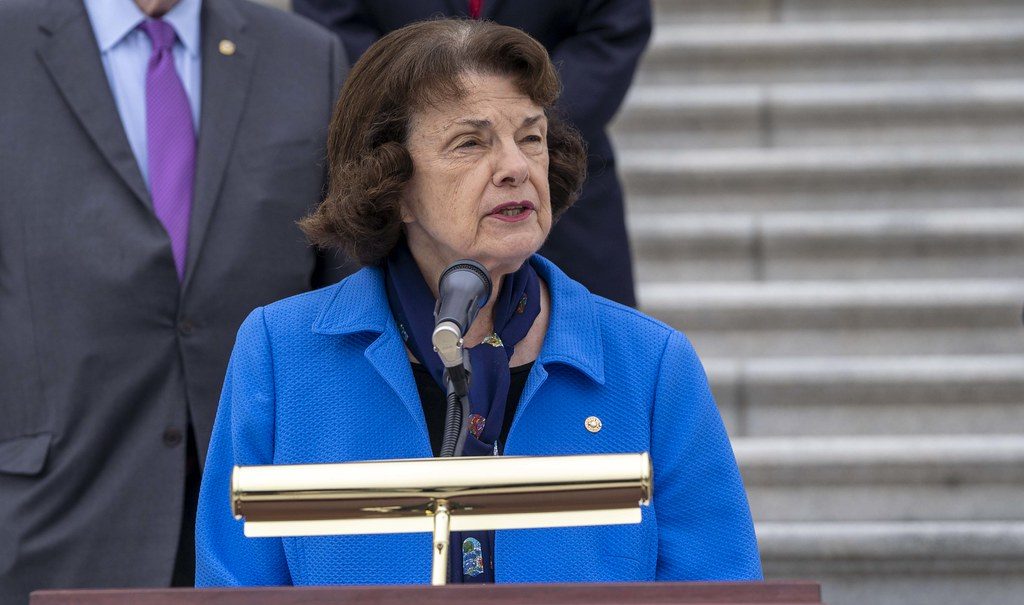Dianne Feinstein, the longest-tenured female U.S. senator in history and first female mayor of San Francisco, passed away from natural causes early Friday morning at her home in Washington D.C., James Sauls, Feinstein’s chief-of-staff, confirmed in a statement. She was 90.
“Senator Feinstein never backed away from a fight for what was just and right,” Sauls wrote in the press release. “At the same time, she was always willing to work with anyone, even those she disagreed with, if it meant bettering the lives of Californians or the betterment of our nation.”
In a career spanning parts of seven decades, Feinstein was an instrumental member of the Democratic Party and championed several issues, such as women’s reproductive rights, gun control and environmental protection.
Feinstein’s vocation to public office began with an election to the San Francisco Board of Supervisors in 1969. She abruptly assumed mayoral duties in 1978 after the high-profile assassinations of Mayor George Moscone and Supervisor Harvey Milk, making history by becoming the first female mayor in the city’s history.
“Her dedication to public service was only exceeded by her love for San Francisco, and this City loved her back,” wrote San Francisco Mayor London Breed in a statement. “Her legacy as one of San Francisco’s true leaders will be admired for generations to come. Simply put, there will never be another Dianne Feinstein.”
After serving two terms as mayor, Feinstein unsuccessfully ran for governor of California in 1990, clinching the Democratic nomination but narrowly falling to Republican senator Pete Wilson by only 266,707 votes.
“She was a political giant, whose tenacity was matched by her grace,” wrote California Gov. Gavin Newsom in a statement. “She broke down barriers and glass ceilings, but never lost her belief in the spirit of political cooperation. And she was a fighter — for the city, the state and the country she loved. Every race she won, she made history, but her story wasn’t just about being the first woman in a particular political office, it was what she did for California, and for America, with that power once she earned it.”
She returned to the spotlight when she was elected to the United States Senate in 1992, where she eventually became the first female to chair the Senate Intelligence Committee and Senate Rules Committee while also serving as a ranking member of the Senate Judiciary Committee.
“Especially in later years as a ranking member of substantive committees, she was able to play a significant role in what those committees were paying attention to, what decisions got made, what bills got consideration from that committee and thus then on to the floor of the Senate,” said Rebecca Eissler, assistant professor of political science at San Francisco State University. “She played a significant role in those policy areas.”
One of her significant achievements was the authorship of the 1994 Federal Assault Weapons Ban, a bill that President Bill Clinton ultimately signed into law. This legislation barred the civilian manufacturing of specific semi-automatic firearms categorized as assault weapons, along with certain high-capacity ammunition magazines.
The data resulting from the 10-year ban, which lasted until 2004, is still up for interpretation. In a 2020 review by the RAND Corporation that analyzed findings from five studies concerning the impact of state-level assault weapon bans on violent crime, it was determined that there is insufficient evidence to definitively conclude whether such bans have a discernible effect on overall homicides and firearm-related homicides.
“I think it’s fair to say that the legislation that she was involved in made a significant difference and actually provides a case point for modern gun control advocates,” Eissler said. “ I think that that is a part of her legacy that is of use to people today and then into the future.”
Amanda Roberti, assistant professor of political science at SFSU, also noted that Feinstein’s trailblazing political tenure in California paved the way for women running for office nationwide.
“I think a lot of folks might get discouraged, particularly women,” Roberti said. “It’s already a challenge. There are already so many societal and institutional roadblocks for women to get into office. So for her to be able to have that sticktoitiveness is really important. For those reasons, she’s really inspirational.”
Another one of Feinstein’s capabilities was to continue to evolve regarding some of the top issues her party was directly facing.
During her mayoral tenure in San Francisco in 1982, she vetoed a bill that aimed to extend insurance benefits to domestic partners of city employees, a move that had repercussions for LGBTQ+ individuals in committed same-sex relationships. In 2022, she altered her position, becoming a co-sponsor of the Respect for Marriage Act, which called for federal and state governments to acknowledge both same-sex and interracial marriages. She did a similar shift in views regarding capital punishment.
“I think the biggest lesson I’ve encouraged my students to take away from studying Feinstein’s career is that it’s okay to change your mind,” Eissler said. “It’s okay to say, ‘I held the wrong position.’ Over time, as she learned more as public discussions and opinions changed, she was not afraid to say, ‘I’ve changed my mind. I’ve learned more. My understanding is different. And I now hold this position.’ I think that’s a very hard thing. The politicians don’t like doing this, but I think it’s an important part of being human to be able to do that.”
In her final years in office, Feinstein was scrutinized with concerns from constituents and colleagues about her mental and physical fitness. It was reported by the New York Times in 2022 that she struggled with short-term memory loss. She was also hospitalized with shingles in March and entered a 10-week absence from Capitol Hill as a result.
She announced in February that she wouldn’t be seeking reelection in 2024.
“There was very public –– especially in the last few months last year –– and very clear signs,” Eissler said. “Were this a member of our own families, I think we would have been just as gravely concerned as we were as constituents about her health, about her competency, about what she could do in the job at this point. I think it’s a conversation that really does require nuance because age isn’t just a number. It is about how you’re living that age.”
Newsom will be responsible for quickly choosing a replacement for Feinstein’s vacant Senate seat. In March 2021, Newsom stated he’d select a Black woman in the event Feinstein were to retire. Additionally, Newsom said he’d refrain from choosing any of the candidates already in the race for the Senate seat when it’s up for election next fall.
“I think he’s got a tough choice to make –– to make somebody who can do the job well for a year while also knowing that they are more of a caretaker for the seat rather than possibly running for the election,” said Jason McDaniel, associate professor of political science at SFSU. “This is a little bit different from what he did the last time when he appointed (Alex) Padilla to take on the seat after Kamala Harris was elected to the vice presidency.”














